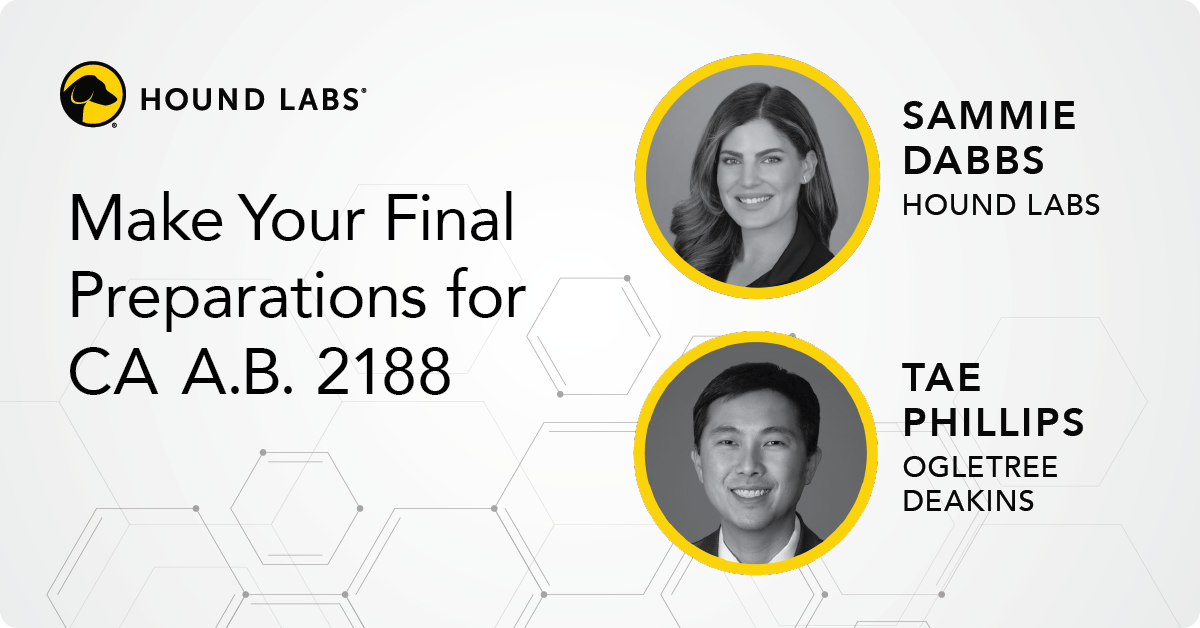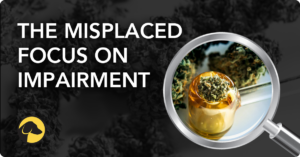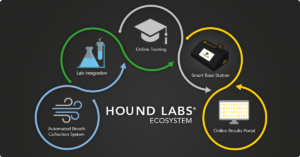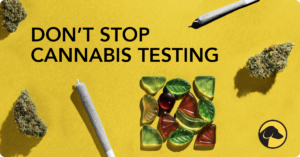
Two Perspectives, One Solution: How to Prepare for CA A.B. 2188
On or before January 1, 2024, impacted employers in California should check to be sure their drug testing policies and practices comply with Assembly Bill 2188, otherwise referred to as CA A.B. 2188. Employers in all states should take notice, as employment attorneys indicate the bill could signal the next trend of marijuana-related legislation impacting the workplace. This trend has already come to fruition in Washington.
California A.B. 2188 features two main components relevant to employers’ cannabis drug testing programs:
- Target of detection: The law prevents impacted employers from using certain drug test specimen types (such as urine and hair) that detect non-psychoactive THC metabolites as a basis for adverse employment actions
- Window of detection: The law prevents some employers from taking adverse employment actions based on a test result that reflects the off-duty use of cannabis
Employers may continue to conduct cannabis testing and take action based on positive test results, using sample types that do not screen for non-psychoactive THC metabolites (such as breath) and do not reflect past use that occurs outside of the workday.
The law largely aims to prevent discrimination against off-duty cannabis use that occurs away from the workplace. In a recent webinar, Tae Phillips, a labor and employment attorney for the law firm Ogletree Deakins, and Sammie Dabbs, Chief Revenue Officer at Hound Labs, explored the details of CA A.B. 2188, the implications of the law, and the steps employers should take to prepare for the change. In this piece, we share their perspectives and the reasons breath positions employers to comply with CA A.B. 2188.
LEGAL PERSPECTIVES ON CA A.B. 2188
Tae Phillips
California Assembly Bill 2188 amends the state’s employment anti-discrimination law, the Fair Employment and Housing Act (FEHA). This law generally limits some California employers from taking adverse employment actions based on a drug test that finds non-psychoactive THC/cannabis metabolites in urine, hair, or bodily fluids. I refer to this as the “Restricted Drug Test Protection.” In addition, most California employers will be prohibited from taking adverse employment actions based on marijuana use that occurred outside of the workplace. I call this the “Off-Duty Conduct Protection.”
The first thing I want to stress about this law is that it is taking effect very soon – January 1, 2024 – and it’s imperative California employers consider the practicality of complying with it now before it’s implemented.
The second item of importance to employers not only in California but throughout the United States, is that this is the first time we’re seeing a law related to marijuana legalization somewhat merge with a separate, “traditional” employment civil rights law. This law signals what I believe to be the next trend of marijuana-related legislation impacting the workplace. Employers everywhere should be paying attention to what’s happening with CA A.B. 2188.
With all of this in mind, let’s discuss the details and implications of CA A.B. 2188. Depending on your vantage point, the law creates either two employment protections for cannabis users OR two restrictions and prohibitions for employers. In both cases, the onus is on employers to adapt their drug testing programs to comply with the new law.
The law restricts some employers from taking adverse action against individuals based on a positive marijuana drug test that screens for non-psychoactive THC metabolites. This clause represents one of the most challenging aspects of the law for employers who want or need to continue screening for cannabis because they will no longer be able to act on results from urine, hair, or any other tests that detect metabolites. Instead, they will need to begin utilizing a THC test that detects the active THC molecule.
Additionally, the off-duty conduct protection creates a challenge because employers will not be able to take adverse action against an individual for using cannabis off the job and away from the workplace. This is where the window of detection, or ‘lookback period,’ of a drug test comes into play. Tests that screen for metabolites often have longer detection windows, meaning they can trigger a positive result based on cannabis use that occurred days or weeks before the test. Tests like urine and hair, in addition to those capturing metabolites, will also be essentially prohibited because their results may reflect off-duty cannabis use now protected under CA A.B. 2188.
It’s also critical to be clear about what CA A.B. 2188 doesn’t say. The law does not prohibit testing for marijuana in general and does not negate an employer’s right to maintain a drug-free workplace. Similarly, it does not permit an employee “to be impaired by, or to use cannabis on the job.” The law includes exemptions for some positions, for those requiring federal government background investigations or security clearance, and for certain roles in the building and construction trades. Further, laws or regulations requiring testing for controlled substances, or for positions regulated by the federal Department of Transportation, will still stand.
POLICY PERSPECTIVES ON CA A.B. 2188
Sammie Dabbs
Since CA A.B. 2188 was passed in September 2022, employers have reached out to our team of experts at Hound Labs with one question: How do we comply with this law so we’re fair to our applicants and employees, but also continue to mitigate workplace risks related to THC use?
While we can’t offer legal advice – that’s when we turn to Tae and his team at Ogletree Deakins – we do discuss how employers can evaluate their current drug testing policies to better account for CA A.B. 2188. That seems to be the right place to start for most employers as they consider how to continue testing for THC, moving from a metabolite-based sample type to a test that detects the THC molecule itself.
The first item we discuss is the employer’s timeframe for testing employees. We understand employers have a variety of testing use cases (e.g., pre-employment, reasonable suspicion, random, post-accident, etc.) and implement these in different ways or for different types of employees (e.g., safety-sensitive, security-sensitive, etc.). It’s critical for employers to evaluate what positions may be tested and in what scenarios and then to adapt those decisions to comply with any restrictions CA A.B. 2188 has introduced.
We also continue to hear that employers are concerned about how the law will impact their recruiting and retention efforts. For employers with zero-tolerance policies, positive drug tests were grounds for firing an employee or not hiring a candidate. However, many of these legacy drug test specimens will no longer be allowed under CA A.B. 2188 because they test for non-psychoactive metabolites. Employers will need to find a new test – like breath – and may need to consult with a Medical Review Officer to revise how they’ll address a non-negative result to comply with CA A.B. 2188. More than ever, we are working with employers to enhance their stand-down policies, second-chance agreements, and conditional employment options as avenues to retain more employees following a first offense.
Another policy consideration we discuss with employers is how to reinstate cannabis testing now that breath is a viable option under CA A.B. 2188. We found that some employers stopped THC testing because the long windows of detection of urine and hair were impacting their hiring pipelines; they couldn’t find enough candidates who could pass a pre-employment drug screen. However, a National Safety Council survey has reported that more than half of employers who removed cannabis testing have seen an increase in safety incidents. Clearly, dropping THC testing as a response to CA A.B. 2188 is not the safest or most effective response.
Breath testing, however, is a game-changer that provides all employers with a reliable way to mitigate safety risks by maintaining workplace drug testing. In most of our conversations, it quickly becomes apparent that breath testing is an ideal solution for many California employers since the test specifically isolates recent use, tests for the active THC molecule, and has the shortest detection window of all drug test specimen types.
Finally, while Tae pointed out that developing a clear understanding of CA A.B. 2188 and what it means is one of the biggest challenges for employers, I’d like to stress the importance of employee education in evangelizing any policy changes. When a new law passes that impacts a drug testing policy, it naturally causes concern, anxiety, and sometimes fear. It’s critical to invest time to ensure employees are fully aware of why policy changes are being made and how they’ll be impacted. In the case of cannabis breath testing, employers need to explain to their teams how recent use testing keeps workplaces safe, treats employees fairly, complies with the law, and allows personal choices to remain private.
THE CA A.B. 2188 EFFECT
Similar legislation has already passed in Washington. And, while employers in New York and a handful of other states are dealing with the challenges of “off-duty conduct laws,” the added testing restriction element introduced by California adds an entirely new wrinkle to an already difficult issue. Employers must learn to adapt and strategically consider new THC testing technologies to comply with these laws and help create safe workplaces.
With its short detection window and ability to specifically isolate only recent use, it’s clear that breath testing creates the surest path for employers to comply with both the intent and the letter of the law tied to CA A.B. 2188. Our team of experts is here to help you implement the Hound® solution. Please reach out for more information or assistance.
ABOUT THE AUTHORS

Tae Phillips
Labor and Employment Attorney, Ogletree Deakins
Tae Phillips is a national subject matter expert on workplace marijuana and drug testing issues. He regularly assists clients nationwide in handling the rapidly evolving landscape of medical and recreational cannabis legalization laws and their impact on employers. In addition to providing practical advice and counsel, Tae has also handled high-profile litigation involving these difficult issues.
Sammie Dabbs
Chief Revenue Officer, Hound Labs
Sammie Dabbs is an energizing sales leader who drives multimillion-dollar revenue through partnerships with enterprise-level organizations across multiple industries. In her role at Hound Labs, Sammie leads a team that effectively partners with clients to solve critical challenges related to balancing workplace safety with fairness.


December 7, 2023
By HOUND LABS + OGLETREE DEAKINS
Share











